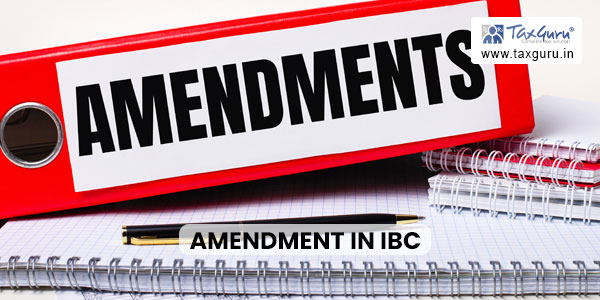An Urgent Need To Train IPR’S And Amendment In IBC To Ensure Due Credits On Operational Creditors
Recently, Justice Ashok Bhushan, former judge of the Supreme Court, said the move to inaugurate an insolvency law regime was one of two most important changes in Indian legislative policy; the other being the introduction of goods and services tax (GST). He also said that Prime Minister Narendra Modi himself is very keen on this issue and has been following all developments extensively.
A key question that came up at a recent colloquium was: what happens if a company is struck by insolvency proceedings? In India, there are two major bodies that deal with the issue: The Insolvency and Bankruptcy Board of India (IBBI) and the National Company Law Tribunal (NCLT). While the outcomes of both these tribunals are similar — liquidation procedure followed — there are differences between how they study issues such as financial assets. These differences include the approach taken by both bodies when dealing with operational creditors versus what constitutes a priority claim. The maximum casualty is of the operational creditor who are at the very bottom of the distribution chain. The financial creditors take the major share, while the operational creditors get nothing. The legislature may take a call on this. We hope that this year we will have some more amendments in the code addressing pertinent issues.”

What role does IRP plays?
Insolvency resolution professionals (IRPs) play a critical role in the insolvency resolution process under the Insolvency and Bankruptcy Code (IBC). They are responsible for managing the affairs of the company during the insolvency process, preparing a resolution plan, and submitting it to the creditors for their approval. The success of the insolvency resolution process depends on the skills and expertise of the IRPs. Therefore, it is important to ensure that they are properly trained to carry out their duties effectively. One of the main reasons for the need to train IRPs is the complexity of the insolvency resolution process. The IBC is a relatively new legislation and the process can be quite complex, involving multiple stakeholders and a wide range of legal, financial, and operational issues. IRPs need to have a thorough understanding of the IBC, as well as the relevant laws and regulations, to be able to navigate the process successfully.
Another reason for the need to train IRPs is the importance of managing the assets and operations of the company during the insolvency process. IRPs are responsible for ensuring that the company’s assets are preserved and its operations are continued, to the extent possible, during the process. This requires specialized skills and knowledge in areas such as financial management, operations management, and corporate governance. Moreover, IRPs also have to deal with the multiple and often conflicting interests of the stakeholders involved in the process, including the creditors, employees, and shareholders. They need to be able to communicate effectively with all stakeholders, and to manage their expectations and concerns.
The need to train Insolvency resolution professionals is crucial in ensuring that the insolvency resolution process is conducted effectively, efficiently and in a transparent manner. It is important that they are properly trained in the IBC, relevant laws and regulations, financial and operations management and in communicating with stakeholders. This will enable them to navigate the process successfully, and to make the best possible decisions for the company and its creditors.
Operational creditors play a vital role in the functioning of a business. They are suppliers, vendors, and other parties who provide goods and services to a company in the ordinary course of business. However, when a company faces financial difficulties and is unable to pay its debts, operational creditors may find themselves in a difficult position. In this blog post, we will discuss the rights and responsibilities of operational creditors in the event of a bankruptcy or insolvency. When a company files for bankruptcy or is placed in receivership, a priority is given to certain creditors over others. Secured creditors, such as banks and other financial institutions, are typically the first to be paid, followed by employees and other priority creditors. Operational creditors, on the other hand, are considered unsecured creditors and may not be paid until after these priority creditors have been satisfied.
In a bankruptcy or insolvency situation, operational creditors may be entitled to a pro rata share of any assets that are available for distribution to creditors. This means that they will receive a percentage of the assets based on the total amount of debt they are owed by the company. However, the exact percentage of the distribution that operational creditors receive may vary depending on the specific circumstances of the case and the laws of the jurisdiction in which the bankruptcy or insolvency is taking place. It is important for operational creditors to keep track of the progress of a bankruptcy or insolvency case and to take steps to protect their rights. This may include filing a claim with the court and participating in any meetings or hearings that are held. Operational creditors should also be aware of any deadlines for filing claims or taking other actions, as failure to meet these deadlines may result in a loss of rights. However, they are considered unsecured creditors and may not be paid until after priority creditors have been satisfied. It is important for operational creditors to keep track of the progress of a bankruptcy or insolvency case and to take steps to protect their rights.
The Insolvency and Bankruptcy Code (IBC) is the primary legislation in India that governs bankruptcies and insolvencies. However, operational creditors have been facing some challenges under the current framework of the IBC, which has led to the need for an amendment to the code.
The Main cause:
One of the main issues faced by operational creditors is the lack of representation in the insolvency resolution process. Under the current framework of the IBC, only financial creditors are allowed to vote on the resolution plan proposed by the resolution professional. This means that operational creditors have no say in the outcome of the process, even though they may be owed a significant amount of money by the company. Another issue faced by operational creditors is the lack of priority in the distribution of assets. Under the current framework of the IBC, operational creditors are considered unsecured creditors and may not be paid until after secured creditors and other priority creditors have been satisfied. This can result in operational creditors receiving only a small percentage of the assets, if any. To address these issues, there have been calls for an amendment to the IBC to give operational creditors greater representation and priority in the insolvency resolution process. This may include allowing operational creditors to vote on the resolution plan and giving them priority in the distribution of assets. Additionally, the Government of India has also proposed an amendment to the IBC to ensure that small vendors and suppliers are treated at par with the financial creditors. The amendment will help the operational creditors to get their dues in an expeditious manner, which will boost their business and help them to carry on their operations.
In conclusion, operational creditors have been facing some challenges under the current framework of the IBC, which has led to the need for an amendment to the code. The amendment will give operational creditors greater representation and priority in the insolvency resolution process, which will help them to get their dues in an expeditious manner, and will boost their business.





